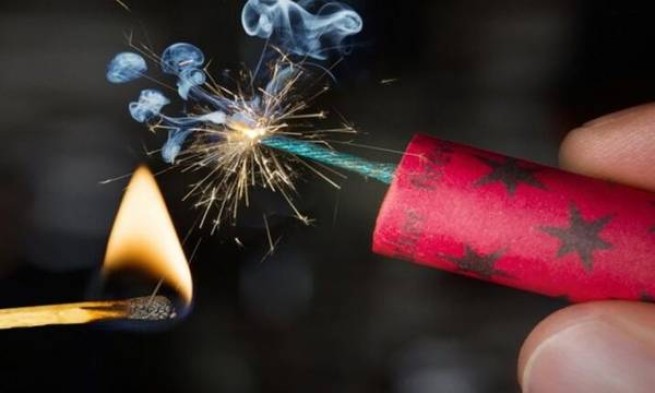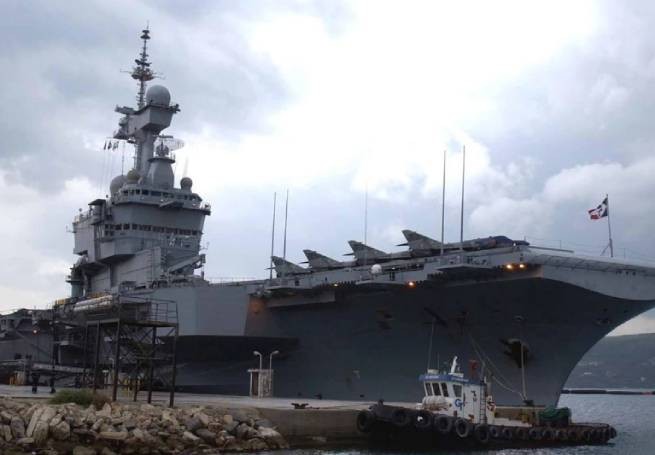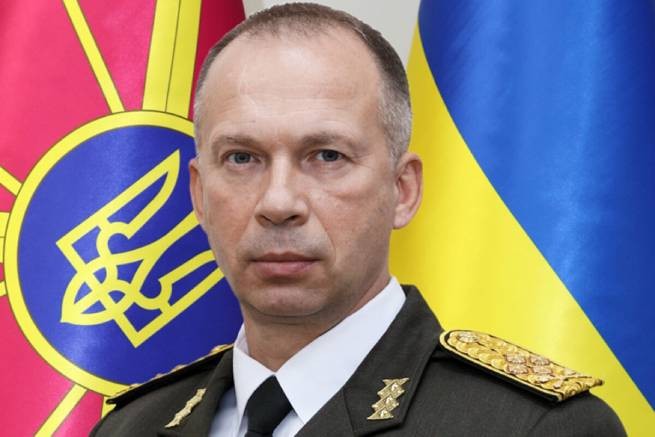58-year-old Colonel General Alexander Syrsky, who was the commander of the Ground Forces before being appointed commander-in-chief, was called upon to implement a different approach to rotations, front management, mobilization and recruiting, which Ukrainian President Vladimir Zelensky spoke about.
His appointment comes against the backdrop of unprecedented pressure on Avdiivka, where fighting has spread from the surrounding area to the urban area. The Russians moved additional forces to this direction, significantly increasing the number of air strikes and storming the city from the north and south. This is task number one for Syrsky in his new position. An equally important challenge is the replenishment of the Ukrainian army. This week parliament accepted the bill on mobilization is in the first reading. Who is he, Alexander Syrsky, and what to expect from the new commander-in-chief of the Armed Forces of Ukraine?
Education and career development
A graduate of the Moscow Military School, a fan of Plutarch and Clausewitz, the whole country saw Syrsky on television screens in 2021 – he launched the ceremonial march of troops along Khreshchatyk during the celebration of Independence Day. At that time, he had already been Commander-in-Chief of the Ukrainian Ground Forces for two years.
Alexander Syrsky is 58 years old, he was born in the RSFSR, in the village of Novinki, Vladimir Region, into a military family. His relatives still live in Russia. The TASS agency wrote that it allegedly found Syrsky’s brother Oleg, living in Russian Vladimir and not communicating with a relative. Confirm or deny this information publication “UP” failed.
In 1986, Syrsky graduated from the Moscow Higher Combined Arms Command School. One of the Russian commanders of the SVO, Alexander Dvornikov, and the commander of the Joint Forces, Sergei Naev, also graduated from it. After the outbreak of a full-scale war, Syrsky spoke in an interview with ABC News about the benefits of his previous training in Moscow:
“It’s easier to understand your enemy’s actions this way. You can predict what he might do in different situations.”
In the 1990-2000s, Syrsky continued his education at the National Defense Academy of Ukraine in Kyiv. Since 1986, he began his military career as a platoon commander of the 25th Guards Motorized Rifle Division (Lubny, Poltava region). He went through all the command ranks and in 2002 became the commander of the 72nd mechanized brigade.
In 2013, Syrsky served as first deputy chief of the Main Command Center of the Armed Forces of Ukraine. His area of responsibility was cooperation with NATO. In February 2015, the Bars group formed by Syrsky covered the exit of the Ukrainian Armed Forces from Debaltsevo.
Then about 4.5 thousand Ukrainian troops under his command confronted almost 20 thousand Russians. According to the calculations of volunteers of the Book of Remembrance of those who died for Ukraine, from January 25 to February 18, 2015 died in the Debaltseve direction 268 Ukrainian military.
Against the backdrop of this dramatic battle, the Minsk agreements were signed. For his participation in hostilities on the Debaltseve bridgehead, Syrsky was awarded the Order of Bohdan Khmelnitsky, 3rd degree.
In 2016, Syrsky headed the Joint Operational Headquarters of the Armed Forces of Ukraine, and in 2017 he commanded the Anti-Terrorist Operation in eastern Ukraine. In 2019, Syrsky became commander of the Ground Forces of the Ukrainian Armed Forces. Here’s how writes about Syrsky 2023 “The Guardian”:
“Syrsky’s closest aides describe him as “a military man to the core.” He is said to wake up at 5.20am to do an hour’s exercise before his workday and has little interest in material things. “I sleep four and a half hours a night,” he said. To the question “And before the start of a full-scale war?” laughs: “Maybe five hours. Five and a half on Sunday.”
He photographs sunsets during his weekly visits to the front and shares them with colleagues… And on his bedside table he keeps the works of the Prussian general Carl von Clausewitz. Syrsky says:
“I’ll tell you, reading Plutarch and other authors, watching documentaries about ancient Greek history – they used the same principles of warfare that we use in our time. Because the main principles of war remain unchanged… Nothing has changed. Okay, maybe The complexity of technology and the degree of automation of actions have changed.”
Last July in an interview To the BBC, he spoke with restraint about the possibility of an early victory for Ukraine:
“We would like to get very fast results. But in reality this is almost impossible.”
Zelensky calls Syrsky the most experienced commander
He did play a significant role in several of the defining operations of the Ukrainian army after the Russian full-scale invasion. First of all, we are talking about successful defense of Kyiv in February-March 2022. It was Syrsky who was responsible for preparing the capital for defense and for the line of containing the enemy at the conventional border of the Irpen River.
“A calm voice, clear answers, short questions, commands are given. In the shortest possible time, together with special forces, the job was done,” NSDC Secretary Alexey Danilov recalled the situation in the first days of a full-scale invasion, when it was necessary flood part of the Kiev region and prevent the movement of Russians. “The Russian offensive initially stalled and then fizzled out.”
For the successful defense of Kyiv and the liberation of the north, on March 18, 2022, Syrsky was awarded the Order of Bohdan Khmelnitsky, 2nd degree. And three weeks later he received the Hero of Ukraine – “for personal courage, significant contribution to the defense of state sovereignty and territorial integrity of Ukraine.”
Then Syrsky commanded two counter-offensive operations of the Ukrainian Armed Forces in the Kharkiv region: in the spring of 2022, when it was possible to push Russian forces north of the city to make artillery shelling impossible, and in September of the same year, when, in a rather risky attack, they repulsed almost the entire occupied territory of the Kharkiv region.
Before his appointment as Commander-in-Chief of the Armed Forces of Ukraine, Syrsky also commanded the Operational-Strategic Group of Forces (OSG) “Khortitsa”, which was responsible for one of the most difficult sectors of the front – from Kupyansk and Kharkov to Bakhmut. That is why another large and very grueling battle is associated with his name.
Defense of Bakhmut
There are several different views regarding assessments of this operation in the military environment. On the one hand, in Bakhmut, Ukrainian forces actually defeated one of the most combat-ready Russian units – the Wagner PPK. On the other hand, during the 10-month defense they suffered huge losses in several of the most combat-ready units, including the 93rd brigade. This was one of the reasons for the tension between Commander-in-Chief Zaluzhny and Syrsky.
Front-line journalists of “UP” have repeatedly encountered the opinion of fighters that the city, which acquired the poeticized status of a “fortress”, was in fact not ready for defense. That is, it did not have the required number of defensive fortifications. As one of the company soldiers of the 3rd OSB with the call sign “Foka” noted: “The Bakhmut fortress is a fortress at the expense of the destroyed Ukrainian military.”
He also noted the ill-conceived nature of some of the operations in which he had to participate – in particular, in an attempt to recapture Kurdyumovka at the end of 2022. The 3rd Special Operations Brigade was given only a day to plan the operation.
In April 2023, one of the servicemen of the 93rd brigade, who at that time was taking care of the delivery of ammunition and provisions to Bakhmut, told reporters: “We dig trenches at night, and the Russians enter them in the morning.” This phrase described one of the main problems in the defense of the city – the lack of sufficient quantity and quality of equipped positions.
It was the heavy defense in the Bakhmut direction – the battles in Kleshcheevka, Kurdyumovka, Soledar and Bakhmut – that largely gave rise to the idea of Syrsky as a commander who did not take human losses into account. Western media have repeatedly written that the Bakhmut campaign cost Ukraine more than it received as a result.
What changes are expected from Syrsky
Introducing Syrsky as commander in chief, Zelensky made it clear what changes exactly? in the Defense Forces he is waiting. First of all, a realistic action plan for the Ukrainian Armed Forces for 2024. It is precisely because of the absence of this plan, with the likely submission of the Office of the President and through the mouth of Maryana Bezuglain November 2023, calls for Zaluzhny’s resignation began.
Syrsky is also expected to fairly redistribute Western weapons in favor of the first line of the front. Separately, the president emphasized the need to solve logistics problems. Even during a press conference in December last year, Zelensky spoke about 26 thousand drones that were lying in one warehouse and did not reach the front:
“Avdiivka should not wait for the generals to figure out where the drones are stuck in their warehouses.”
Syrsky must correct the situation with the overcrowding of headquarters and build an effective rotation system. Zelensky voiced an opinion that has been heard in the presidential circle for some time: there are almost a million people in the Defense Forces, but “most of them have not felt the front, while a minority on the front line is actually fighting.”
Syrsky is tasked with improving the quality of training for fighters. Only trained soldiers should fight on the first line of the front, Zelensky noted. The new commander-in-chief must solve problems with mobilization, although it is worth recalling that it is the command of the Ground Forces, which Syrsky commanded, that territorial recruitment centers are subordinate to.
Syrsky will have to decide who will become the first commander in Ukraine Forces of unmanned systems. According to UP sources in the government, one of the candidates for this post is Vadim Sukharevsky, currently heading the 59th brigade, which included one of the most famous UAV companies, “Birds of Madyar”.
The candidacy of Alexander Syrsky was considered one of the most likely since the possibility of changing the commander in chief began to be discussed. Back in 2022, Syrsky’s active support from the Office of the President was noticeable. “The Economist” in December 2022 wrote:
“Some around the president would like to replace him (Zaluzhny) with General Alexander Syrsky, commander of the Ukrainian Ground Forces, over whom General Zaluzhny was promoted last year.”
Popularity and assessment of the new commander in chief in Ukraine
Syrsky’s media was supported by telegram channels controlled by the OP. But even with such support, Syrsky did not gain popularity among Ukrainians not involved in the Armed Forces of Ukraine. Among the main complaints is a fairly common assessment of him as a commander who knows how to carry out the tasks assigned to him, but at the same time does not always take into account human losses.
The Ukrainian military says different things about the new commander in chief. Some give credit for the planning and execution of the Kharkov offensive in September 2022, the defense of Kyiv at the beginning of the war, and the defense of Bakhmut against five times the Russian forces. Others recall 2015 and the encirclement of the Armed Forces of Ukraine near Debaltseve, where Syrsky was directly related to the planning of the operation, heavy losses in Bakhmut-Soledar, they are called a “butcher” for not sparing the soldiers. Still others believe that Syrsky is prone to adventures, because the plan for the Kharkov offensive included the capture of Starobelsk and access to Lugansk, which could lead to Russian counterattacks on the extended Ukrainian communications.
Speaking about the Russian-Ukrainian war, they often point out that “the small Soviet army is not able to defeat the great Soviet army.” Therefore, the Ukrainian army needs to evolve in order to defeat the enemy not with numbers, but with the power of technology and skillful management. And one of the biggest risks is that this evolutionary movement should be led by a person who in the army has a reputation as one of the most “Soviet commanders.”







More Stories
What blew up the Crimean Bridge in 2022
There will be no forced return of Ukrainian men from abroad; the e-office for those liable for military service will start working on May 18
Will Europe forcibly return Ukrainian draft dodgers?